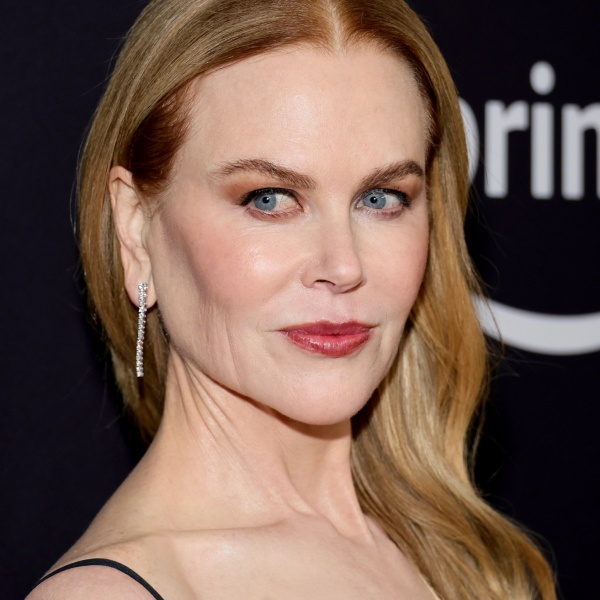
Yes, we already know that Hollywood studios are continuing to pull away from adult oriented dramas, while continuing to pour money into franchises, sequels and spinoffs. And we’ve certainly already sung the praises of HBO for setting the standard for their colleagues by being a welcoming home for auteurs to toil away on the kinds of projects that wouldn’t get them through the front door anywhere else. However, it’s one thing to logically pair Todd Haynes with the period melodrama “Mildred Pierce” but when you surround him with the talent he has here, giving him an almost absurdly generous amount of running time to tell the story his way, it’s practically like the cable network is sticking a thumb in the eye of Hollywood.
Starring Kate Winslet, Guy Pearce, Melissa Leo and Evan Rachel Wood with a score by Carter Burwell, music supervision by Randall Poster and some staggering work by the costume and set designers, Todd Haynes would really have to go out of his way to fuck this up. But he doesn’t. Instead, he delivers a five-part, nearly seven-hour miniseries that is just as rich and moving as anything in the multiplex and it marks a big win for HBO who can now hold this project up as their shining example of the kind of stuff they can finance for directors they wouldn’t be able to set up anywhere else. We’re going to take you through the film a bit in this review, so there will be minor plot spoilers, but we’ll hide the major reveals and twists. As a sidenote, HBO does fumble in the marketing of the film with the trailers focusing mostly on the latter half of the series, giving up the juiciest pieces of the story. If you haven’t seen the spots yet, avoid them from here on out. And oh yeah, there is chatter going around about Evan Rachel Wood’s appearance in the film too — and it’s centered around a pretty significant moment — so again, you’d be advised to pass on those stories until you’ve seen it. With those caveats in mind, read on.

Part 1 & 2: As the series opens, all appears to be domestic bliss. Mildred (Winslet) sits at the kitchen table icing an enormous chocolate cake with her husband Bert (Brian F. O’Byrne) outside doing yardwork. In a shot that quickly will become a shining example of what Haynes does well throughout the series, he quickly establishes the financial stability of the Pierce family by casually letting the camera glide over a wall with framed photos, certificates and blueprints that informs us that Bert is at the helm of a prosperous real estate firm. But already, one can sense the tension roiling underneath the surface. When Bert comes back in to announce he’s finished his chores and heading out, Mildred casually asks if he’ll be back for dinner — a question with a huge suggestion lingering underneath. Bert tries to sidestep it, telling her that if he isn’t back to go ahead and have dinner with the kids without him but she calls his bluff and before you know it, he’s packed his bags and is gone for good. Left to fend for herself, Mildred finds a job as a waitress in a diner — in addition to her side business of baking pies and cakes to order — but is ashamed of revealing her new source of income to her kids. Most notably, to Veda (Morgan Turner).
From the first moments we meet her, it’s already apparent that Veda is something special. The oldest of Mildred’s two children, she speaks in an affected cadence of what (she believes) the upper crust speak like. She’s on the edge of adolescence and it only exacerbates her desire to have the finer things in life even if she doesn’t understand — or remains willfully ignorant (it’s somewhere in between) — that everything she requires cost money. But Mildred, refuses to be the one to bring her daughter’s dreams back down to reality, and she indulges her whims and fancies to any degree, as long as it ends up with a smile on Veda’s face. But Veda is far more clever and duplicitous than her mother gives her credit for.
As Mildred becomes more and more comfortable working at the diner, she manages to win a contract with them providing her pies and cakes which are a hit with customers. Mildred appears to have everything sorted out in terms of supporting the family with Bert out of the picture, but as always, there’s Veda. It isn’t long before she finds out exactly what her mother is doing for work and she is utterly mortified. This leads to one of many showdowns between mother and daughter and Mildred placates Veda by telling her she was only doing research so she could open her own restaurant. But this lie, to protect her daughter from believing her mother is (horror!) “common” eventually turns into in an actual mission for Mildred and she begins to put the pieces together for her own place.
Part 3: For a series, that for much of the running time sinews from one dramatic event to the next, the opening half hour of the third installment is easily the most joyous. With help from Bert’s former business partner Wally (James LeGros), Ida (Mare Winningham) her friend from the diner and Lucy (Leo) her long-standing best friend and neighbor, Mildred launches her first chicken and waffle restaurant. And it’s a smash. This entire generous, luxurious sequence is a smart move by Haynes. It allows the audience — and Mildred — a chance to enjoy a rare moment of pure happiness because in many ways, this will be the highest point for the character before everything gradually begins to crumble around her in the following episodes. It’s a moment for everyone to put down their guard; even Veda is absolutely thrilled at her mother’s success, even if it’s in something as lowly as cooking and there’s no doubt that the restaurant is the hottest spot in Glendale, California. But oh, then there’s Monty Beragon.
Played with an absolutely perfect sexy, boozy insouciance by Guy Pearce, Monty is bad news all around. You can smell it on him. But the self-described loafer, an owner of a slowly dying fruit company whose dividends keep him afloat and from having to step into an office, is an undeniable charmer who is great in the sack and opens a window into a life that Mildred can only dream of — but more importantly — can also offer her Veda. Does Mildred love Monty? In a raw, carnal sort of way, sure. But it’s a mutually beneficial relationship in many ways. Mildred gets to show Veda the life she’s constantly dreaming about — her current infatuation is becoming a world famous pianist and thanks to Monty’s high falutin’ connections she’s training with one of the best teacher’s in the country — while Mildred and Monty escape their individual problems in each other’s pants. But it can’t last forever, and as the episode draws to a close Monty’s problems are becoming too big to hide in casual sex and their relationship hits the rocks hard.
Part 4 & 5: For the final portion of the series, we pick up the story four years on. Veda, now played by Evan Rachel Wood, has grown into a young woman on the verge of adulthood and if previous episodes only hinted at the lengths of self-sacrifice Mildred will go to for her daughter to succeed, here she is nearly certifiable. On the one hand, things are actually going very well for Mildred. She has expanded to three lucrative, very popular restaurants and the business is now incorporated. But while she is enjoying the greatest success of her life, Veda is crushed. With her famed piano teacher suddenly passing away, her stab at a music career is seemingly over; she is told she simply doesn’t have the chops — even after all that training — to go pro. And when Veda is upset, she is as vicious as they come. She takes a dalliance into acting that doesn’t pan out and when the courting of a rich young man takes a turn for the potentially criminal, Mildred is finally pissed off enough to throw her out of the house. And she does. And she immediately regrets it.
They don’t speak for months — with each passing day wearing considerably on Mildred — but in the interim, Veda has made huge strides. She’s now a famous opera singer on the rise, making more than her mother and then oh, there’s Monty again. Mildred spots him one day on the street and before you know it they’ve rekindled their old flame and it’s bright enough to bring Veda back into the fold. But what happens next….ah, we won’t spoil it but it’s wrenching, moving and shocking all at once. Haynes builds to his grand finale with a composer’s skill and all the pieces he’s put in place throughout, compliment and counteract each other beautifully in a final dramatic symphony. 
If it seems like we’ve talked a lot about the plot, believe us, we haven’t scratched the surface. There is a whole world involving the supporting players Lucy, Ida, Wally and Bert who all play significant roles in the film that we haven’t gotten to and we’ve left out pretty much all the major plot turns and twists of the story. But “Mildred Pierce” is essentially a battle of wills between Mildred and her daughter Veda, and as the story goes on, the former keeps losing the battle and more, increasingly becoming her own worst enemy. The more Mildred tries to do the right thing by Veda, the more her daughter coldly pushes her away. There would be an easy case here for Haynes to judge and show contempt for Mildred, but thanks to a brilliant script and an absolutely tour-de-force turn by Winslet (she has the Emmy in the bag), what emerges is a complex woman whose unquenchable drive to give her daughter the American dream — while sheltering her from any ugliness that life has to offer — is also her greatest undoing. It unfolds like a Shakespearean tragedy, particularly in the last two parts, and like Bard’s own plays no one is left clear of the responsibility of the outcome.
Haynes finds a world of thematic layers underneath the more sordid and sweeping soap opera-esque beats of the story. In addition to Winslet, he gets such ace work from his cast that they elevate the story out of James M. Cain‘s pulpy world into a yarn that in certain aspects and angles casts a mirror and comments (subtly) on today’s attitudes toward ambition. Melissa Leo and Mare Winningham are the warm heart of this story, the beacons in the night for Mildred and for the audience; it’s simply great to watch them step into their roles with a natural grace and elegance. Meanwhile, character players like James LeGros and Brian F. O’Byrne come off the bench and give the film added dimension and texture with solid performances. And we can’t forget Evan Rachel Wood, who is somewhat underrated but whose estimation in the eyes of audiences should rise in leaps and bounds after this turn that made what could’ve been a one-note “bitch” role into something far more meaningful and terrifying. Add to it a lovely score by Carter Burwell (the theme music will not leave your head), choice period selections by Randall Poster and some (expensive looking) authentic design work, you have a film that is not just recreated, but lived in. We were actually a little sad to see it go once the final credits came rolling.
But not everything is rosy, and there are minor quibbles to be had. The mini-series format does mean that any chance for the film to truly flow to a unique rhythm is disrupted by the need to end each episode with a “hook” to make sure viewers tune in to the next part. And while it feels like a fully realized film for much of the time, every now and then the television-like pacing becomes distractingly apparent and jarring against Haynes much more relaxed flow. And we would’ve liked to see some of the monologues cut back, particularly in the second half — in Part 4 especially, the installment nearly grinds to a halt with the number of talky speeches. But when everything else is working so well in the film and the story is this riveting, these very small critiques are easy to look past.
“Mildred Pierce” is a wonderful achievement, that will easily stand up proudly alongside Todd Haynes’ best movie work (and we won’t be surprised if many name this his finest to date). Realized with an eye to detail both in the script and on the set, carried out by a cast who understand the nuances found between the showier moments of their characters and the story, and brilliantly conceived and captured by Haynes, long-form television — and hell, most movies — doesn’t get much better than this.
Part 1 & 2 [B]
Part 3 [B+]
Part 4 & 5 [A-]
“Mildred Pierce” debuts on Sunday, March 27th at 9 PM on HBO with Parts 1 & 2. Part 3 airs on Sunday, April 3rd at 9:15 PM with the series wrapping up on Sunday, April 10th at 9 PM with Parts 4 & 5.





